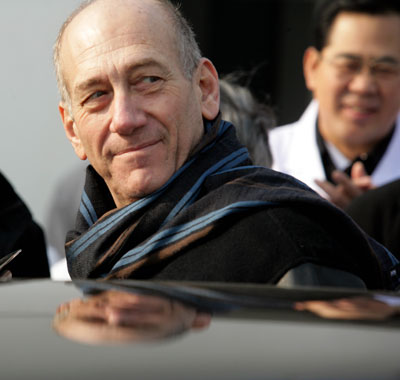China: Iran nuclear issue "high on the agenda"
(AP)Updated: 2007-01-10 19:55
BEIJING - Iran's nuclear program will be a main topic of discussion when Israeli Prime Minister Ehud Olmert meets China's leaders, an Israeli official said Wednesday.
| |||
"He will surely talk about how Israel is concerned by Iranians becoming a nuclear state and what are the consequences that can take place if the Iranians will hold a nuclear bomb or weapon," said the official who spoke on condition of anonymity. "It will be high on the agenda."
Wen, in comments at the beginning of talks with Olmert, said "I look forward to exchanging views with you, Mr. Prime Minister, on how to further promote China-Israel relations and our friendship and cooperation, as well as the Middle East issue."
China, a permanent member of the UN Security Council, has strong trade ties with Iran and has been leery about imposing punitive measures, but it supported the UN resolution that orders all countries to stop supplying Iran with materials and technology that could contribute to its nuclear and missile programs. It also freezes Iranian assets of 10 key companies and 12 individuals related to those programs.
The council has warned that it will adopt further nonmilitary sanctions if Iran continues to refuse to suspend uranium enrichment, a process that produces the material for either nuclear reactors or bombs.
Iran denies that it seeks to build atomic weapons, saying its nuclear program is limited to generating electricity.
Israel's worries that Iran is its most serious threat have been fueled by Iranian President Mahmoud Ahmadinejad's repeated calls to wipe the Jewish state off the map. Olmert has not ruled out a military strike against Tehran's nuclear program but has said he hoped other ways could be found to keep Iran from becoming a nuclear power.
Olmert's trip also marks the 15-year anniversary of the establishment of diplomatic relations between Israel and China, whose good relations have been marred by occasional political and trade tensions.
While Olmert is in China, media reports in Israel said police there planned to question him about allegations he gave favors to business associates in the 2005 privatization of a major Israeli bank.
But an aide to Olmert said the Israeli prime minister had no knowledge of the reported plans.
The reports said Attorney-General Meni Mazuz had decided to order police to interview Olmert next week, after he returns from China.
"We have no knowledge of such an inquiry," said Jacob Galanti, an Olmert spokesman traveling with the prime minister.
The Yediot Ahronot daily reported Wednesday that police want to hear Olmert's account of events before deciding whether to launch a criminal investigation into suspicions that as finance minister he tried to help his friends win a controlling interest in the country's second-largest bank, Bank Leumi, during the sell-off of the government's stake.
The Israeli police declined to comment on the reports and the Justice Ministry did not return calls for comment.
Both Israel and China have emphasized that Olmert's visit is aimed at strengthening economic and trade ties.
Olmert and Wen met for more than an hour, and aides said the two signed three agreements. The first was a cultural agreement from 2007 to 2010. The second was on protocol requirements for the export of citrus fruit from Israel to China, and the third was a memorandum of understanding on water power between the Beijing city government and the Israeli Ministry of Trade, Industry and Labor.
No details on the agreements were released.
China is now Israel's third-largest trading partner, following the United States and Germany. According to the federation of Israeli Chambers of Commerce, Israeli exports to China jumped 31 percent to $740 million (euro565 million) in the first 11 months of last year, compared to $565 million (euro432 million) in the year-earlier period. Imports also rose 29 percent to $2.2 billion (euro1.68 billion) from $1.7 billion (euro1.3 billion) the previous year.
The Israeli official said talks will also center on "the intention of both sides to increase trade to ... US$10 billion (euro7 billion) in 2010."
|
||
|
||
|
|


